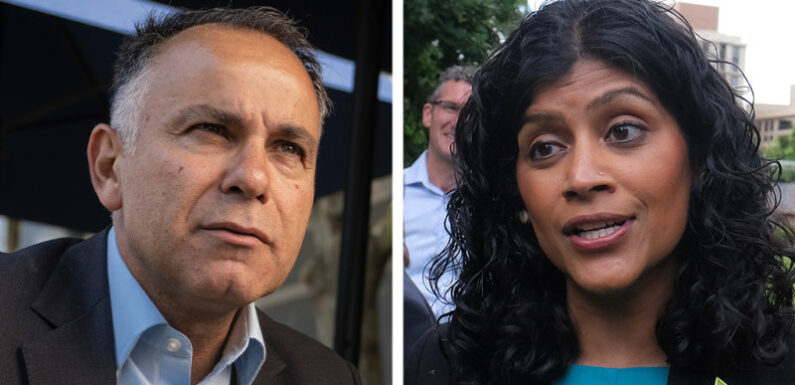
Greens and Legalise Cannabis Party MPs say they struck a deal with the government late on Tuesday to overhaul parliament’s integrity and oversight committee and put an end to Labor’s majority on the body.
In return, the left-wing crossbenchers will reject the opposition’s push for an upper house inquiry into the Andrews government’s treatment of the state’s anti-corruption watchdog.
Opposition Leader John Pesutto and Greens leader Samantha Ratnam.Credit:The Age
Outgoing anti-corruption commissioner Robert Redlich sent a letter to the government in December requesting that Labor share power with the opposition and crossbench as part of an overhaul of influential parliamentary committees.
He also called for the oversight committee to no longer be chaired by a government representative, which the Greens and Legalise Cannabis Party say they have also requested as part of a deal with Labor.
Before the deal was struck, Greens integrity spokesman Tim Read said his party was looking to make an agreement because an upper house inquiry could result in “lots of headlines and no outcome”.
“This way we get a [guaranteed] outcome,” he said.
Redlich’s letter also raised accusations that the Andrews government directed independent auditors to “dig up dirt” on the Independent Broad-based Anti-corruption Commission.
The letter was dispatched in the hope it would be forwarded to all MPs before parliament decided on the make-up of its integrity and oversight committee. The panel oversees agencies such as IBAC and the Victorian Ombudsman and has veto powers over the appointment of the new IBAC commissioner.
Lower house speaker Maree Edwards and upper house president Shaun Leane have said the letter was not distributed to all MPs because Redlich wrote specifically to them and the letter was marked “sensitive”.
On Tuesday, Opposition Leader John Pesutto called on the Greens and other crossbenchers to support the Coalition’s upper house motion for an inquiry.
Rachel Payne and David Ettershank, members of the Legalise Cannabis Party.Credit:Simon Schluter
“If this upper house inquiry doesn’t get up, what does it say about our state? It says we are prepared to accept corruption. It’s as simple as that,” he said.
“We can’t let this be the norm. We can’t let this be who we are as Victorians. It’s the job of a select committee … to test those allegations. They may be substantiated. They might not. [But] if we don’t proceed, we will never know.”
Georgie Crozier, leader of the opposition in the upper house, said she was willing to amend the motion should crossbenchers have any suggestions – as was done for the expanded inquiry into the October floods.
“If there are amendments, of course, we’d look at those,” Crozier said. “We’ve had very fruitful discussions to this point.”
Select committees have the power to subpoena witnesses, meaning Redlich would have almost certainly been asked to give evidence in an upper house inquiry. However, upper house inquiries cannot compel members of the lower house – including Premier Daniel Andrews – to take part.
But Read said a revamped oversight committee would be able to investigate Redlich’s letter should non-government members vote collectively.
“If this gets up, it’ll be to everyone’s credit.”
Legalise Cannabis MP David Ettershank said an upper house inquiry would amount to a year of “infighting and mudslinging”.
“We think the major thing that would come out of [an inquiry], which Redlich himself identifies, is the government should not control the integrity and oversight committee,” he said. “If we can do that now, and save a year of time plus a truckload of taxpayer dollars, why wouldn’t we do it?”
The government does not control a majority in the upper house. But when voting together with the Greens and two Legalise Cannabis MPs, it can pass or block legislation and motions.
The developments come after one of the founders of the state’s anti-corruption commission criticised the premier’s record on integrity and urged upper house MPs to cast aside their political differences to establish a public probe.
Former Victorian Court of Appeal judge Stephen Charles, KC, said he chose to speak out over the weekend because he thought the government should be taking matters of integrity much more seriously.
Andrews has previously said he isn’t in the business of reading correspondence “if not addressed to me” and that he is also “not in the business of accepting allegations that have no basis in fact”.
Asked on Tuesday about Charles’ criticism, the premier said: “I don’t know him and frankly, with the greatest of respect, he doesn’t know me.”
The government is due to appoint a new IBAC boss, Victorian Ombudsman and electoral commissioner within the year.
The government did not respond to requests for comment about its negotiations with the crossbenchers.
The Morning Edition newsletter is our guide to the day’s most important and interesting stories, analysis and insights. Sign up here.
Most Viewed in Politics
From our partners
Source: Read Full Article

